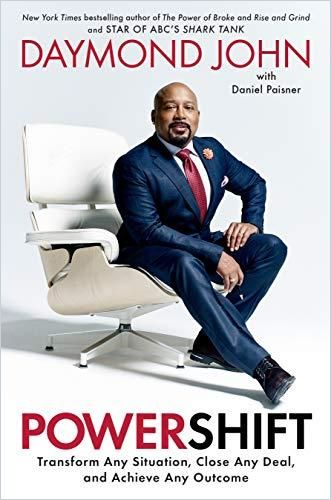Daymond John wants you to succeed as he has, and he provides practical advice to guide you.

Enthusiastic Basic Advice
Self-made millionaire and star investor on TV’s Shark Tank, Daymond John, never forgets his humble beginnings. The best-selling author of Rise and Grind and The Power of Broke (like this book, written with Daniel Paisner), he uses stories and examples from his life and career to show you how to identify and take advantage of opportunities. John consistently demonstrates concern for others as he explains how your attitudes and actions can enhance or damage relationships. He shows a particular affinity for entrepreneurs in search of direction. His early struggles, his basic tools for success and his compelling case for making the world a better place will inspire readers, especially Shark Tank fans.
John built his brand on rah-rah, cheerleading self-help advice, some superficial, some profound, some practical, and some entirely for beginners and self-starters in business. Experienced CEOs or entrepreneurs may find little new here, except an admirably down-to-earth viewpoint. Those fighting their way into their first independent businesses, however, will take heart from John’s clear, basic instruction and giddy attitude.
Defined Objectives
John describes making a “powershift” as knowing when to push for opportunities and when to change course. He argues that failure stems from not understanding your motivation, not knowing how to execute your ideas or not having defined your objectives.
This ability to turn every situation to some kind of advantage is hardwired in all of us. The key is learning how to recognize and tap into that power that you already have within you.Daymond John
Understanding your “why,” John insists, is a source of energy and motivation. He wants you to stand in front of a mirror and ask out loud what you want from life; what you’d like to change in your life; what goal you can achieve tomorrow; what’s stopping you from achieving that goal; and, crucially, why you deserve to succeed. John urges you to believe in yourself.
Represent Yourself
John explains that you have to build a solid reputation and develop a powerful persona. He suggests compiling a list of adjectives explaining who you are or hope to be. If you live up to your words, he believes, they will become part of you. He insists that you should tell the world who you are and periodically update your story and lifestyle. As you welcome more people into your circle, John cautions, remain authentic. Before getting down to a meeting’s business, he advises you to begin by having a casual, get-to-know-you conversation first.
Non-Verbal Communication
Every negotiation, John explains, requires an assessment and understanding of its situation, what you have to offer and how much influence you wield.
When we become content with what we have instead of what we want, we close ourselves off from getting what we deserve.Daymond John
John contends that establishing the tone of a negotiation requires reading people and focusing on the other party’s body language. He cites a study of more than 2,000 negotiations showing that if “one or both parties crossed their arms and legs,” no deals got made.
John warns that you must make eye contact with everyone in a meeting – not only the CEO, but the CEO’s assistant as well. He cautions you to notice who avoids eye contact. He is adamant that glancing at your phone during negotiations indicates indifference and is a big mistake. John celebrates a firm handshake, and urges you to answer all questions with complete sentences. Finally, he calls on you to practice your poker face: Give away as little information as possible.
The First Move
John says flat out that you should make the first move in any negotiation and focus on a common goal. He contends that making a concession on minor points that matter to your counterpart makes both of you happier. He underscores that you should concentrate on each major point separately. John feels that honest dialogue puts your partner at ease and encourages a mutually beneficial approach.
Long-Term Relationships
Every relationship you develop matters because you never know when you will need help from someone. Thinking you can go it alone is a mistake, John warns, clarifying the importance of community.
No matter how great things are right now, you should always be prepared to make a powershift into the next opportunity – and its better to make that move before youre up against it.Daymond John
By being authentic and sincere in business and in life, you bring other like-minded people into your circle. That’s the real deal.
Practical Encouragement
John’s books read as if he dictated – or preached – them. This gives his words a breathless enthusiasm that might sound like hucksterism coming from someone less sincere. John’s astonishment at his own success fuels his core belief that anyone from any background or circumstance can succeed as he has. This makes him all the more insistent. He also understands that people facing the obstacles he faced need constant, practical encouragement and need to know someone has their back. His books provide both; he has never forgotten where he came from or what he would have liked someone to have said to him.
This makes John enormously winning and worth reading, even if you have moved past the beginning of your business. Everyone, from time to time, needs a cheerleader.
If Daymond John resonates with you, in addition to his books listed above, you might enjoy his Display of Power or The Brand Within (written with James “Jim” Cramer). Works that align with John’s outlook include Driven by Robert Herjavec and – for a fascinating but considerably more cynical take on how power works – The 48 Laws of Power by Robert Greene.













